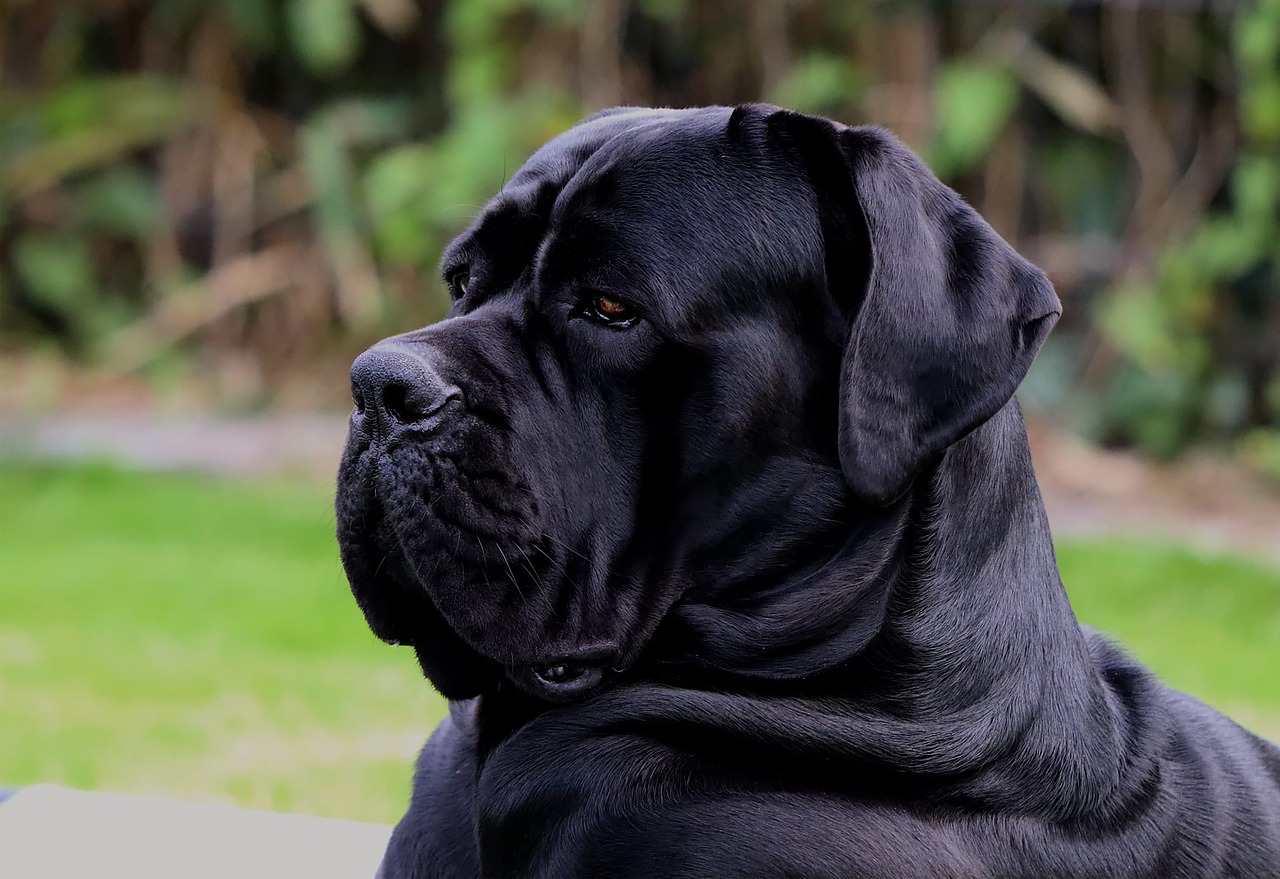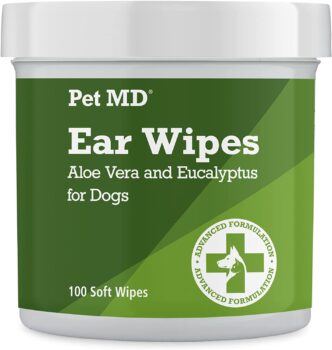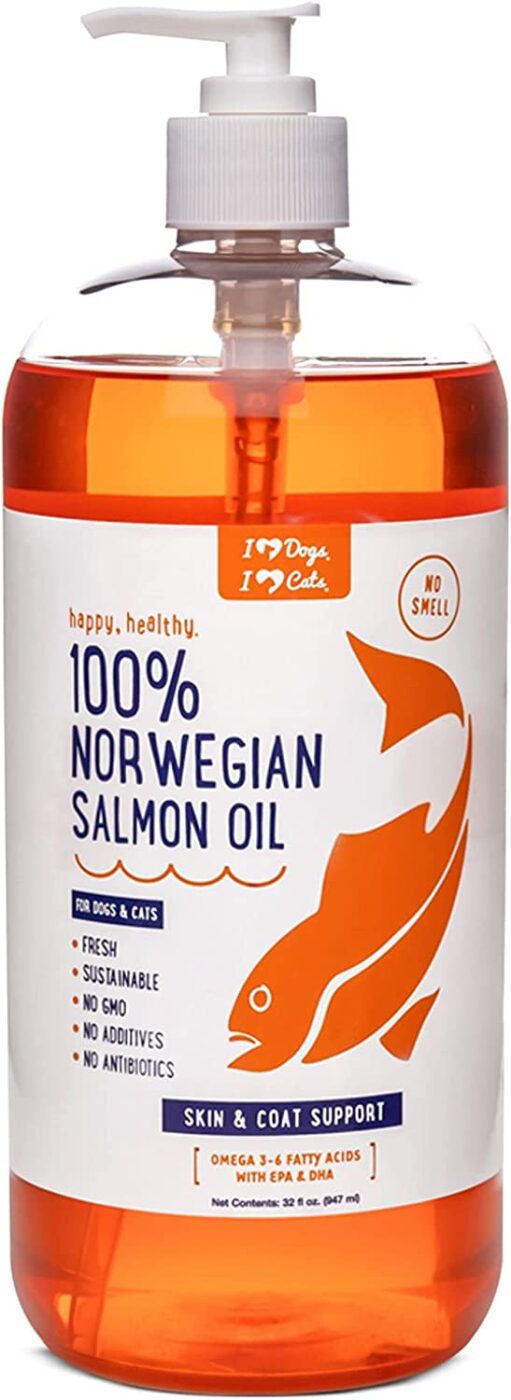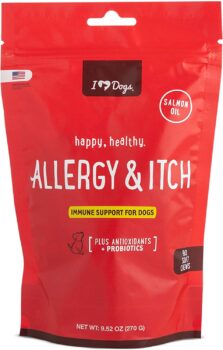Cane Corsos are known for their strength, loyalty, and noble appearance. However, like other breeds with floppy ears, they are prone to ear infections. This article outlines 11 ways to treat and prevent ear infections in Cane Corsos, with special emphasis on the benefits of Omega-3 fatty acids in their diet.

1. Regular Ear Cleaning
Routine ear cleaning can eliminate debris and wax buildup that promotes bacterial growth. Always use a vet-approved ear cleaning solution, and avoid inserting anything deep into the ear canal.
Our favorite ear cleaner is these PetMD brand ear wipes on Amazon.
2. Dry Ears After Exposure to Water
Whether your Cane Corso enjoys swimming or just got caught in the rain, it’s essential to thoroughly dry their ears afterward to prevent a damp environment where infections can thrive.
3. Regular Vet Check-ups
Regular vet visits are important for early detection and treatment of ear infections. Your vet can guide you on proper ear-cleaning techniques and signs to watch for.
4. Balanced Diet
A well-rounded diet supports a healthy immune system. Incorporating Omega-3 fatty acids in your dog’s diet can help combat inflammation and manage allergies, reducing the likelihood of ear infections.
5. Omega-3 Supplementation
Omega-3 fatty acids, found in fish oil and flaxseed oil, can help alleviate allergies due to their anti-inflammatory properties. Consult your vet for the right supplementation advice.
We’re fans of this Norwegian salmon oil on Amazon. It’s a bright orangish-pink color and has no fishy smell at all due to it’s ultra high purity.
6. Allergy Management
Managing your dog’s allergies can significantly reduce the chances of ear infections. This could involve avoiding certain foods, minimizing exposure to environmental allergens, or using prescribed allergy medication.
A few good supplements to help your dog’s allergies are apple cider vinegar, quercetin, and colostrum, all of which are found in many natural allergy supplements like this one.
7. Avoidance of Allergens
If you know that certain substances trigger your dog’s allergies, do your best to minimize their exposure to these allergens.
8. Regular Exercise
Regular exercise helps maintain overall health, leading to a stronger immune system and a lower risk of infections.
9. Grooming
Regular grooming, including trimming any hair around the ears, can improve ventilation and keep the ears dry, reducing the likelihood of infections.
10. Maintain a Healthy Weight
Obesity can increase the risk of various health issues, including ear infections. Maintain a balanced diet and regular exercise routine for your Cane Corso.
11. Use of Prescribed Medication
If your dog frequently suffers from ear infections, your vet may prescribe preventive medication. Always follow their instructions carefully.
FAQ
Q1: What are the signs of an ear infection in my Cane Corso? A: Signs can include excessive scratching of the ear, head shaking, redness, swelling, or discharge from the ear.
Q2: What causes ear infections in Cane Corsos? A: Ear infections can be caused by various factors, including bacteria, yeast, ear mites, foreign bodies, or excessive moisture in the ear. Allergies can also contribute to ear infections.
Q3: Are ear infections in Cane Corsos serious? A: If left untreated, ear infections can become severe, leading to chronic ear disease or even hearing loss.
Q4: Can I use human ear infection treatments on my Cane Corso? A: No. Always consult your vet before administering any treatment. Human medicines may not be suitable or safe for your dog.
Q5: How do I apply ear drops to my Cane Corso? A: Generally, you lift the ear flap, apply the prescribed number of drops, and then gently massage the base of the ear to distribute the medication. However, always follow your vet’s specific instructions.
Q6: Why does my Cane Corso keep getting ear infections? A: Recurring ear infections can be due to several factors, including unresolved allergies, inadequate ear cleaning, or an underlying health condition. Your vet can provide insight into the specific cause.
Q7: How can diet impact ear infections in my Cane Corso? A: A balanced diet, particularly one rich in Omega-3 fatty acids, can help manage inflammation and allergies, reducing the likelihood of ear infections.
Q8: Are there breeds more prone to ear infections than Cane Corsos? A: Dogs with floppy ears are generally more prone to ear infections, but all breeds can be affected. Regular vet check-ups and preventive care can mitigate this risk.
Q9: How often should I clean my Cane Corso’s ears? A: A weekly cleaning is usually sufficient, but your vet may recommend a different frequency based on your dog’s specific needs.
Q10: What should I do if I suspect an ear infection? A: If you suspect an ear infection, reach out to your vet immediately. Prompt treatment can prevent further complications and ensure your dog’s comfort and health.
Preventing ear infections in your Cane Corso involves a combination of regular cleaning, a balanced diet enriched with Omega-3, and overall good health maintenance. Always consult with your vet for personalized advice tailored to your dog’s specific needs.



 Toledo, United States.
Toledo, United States.